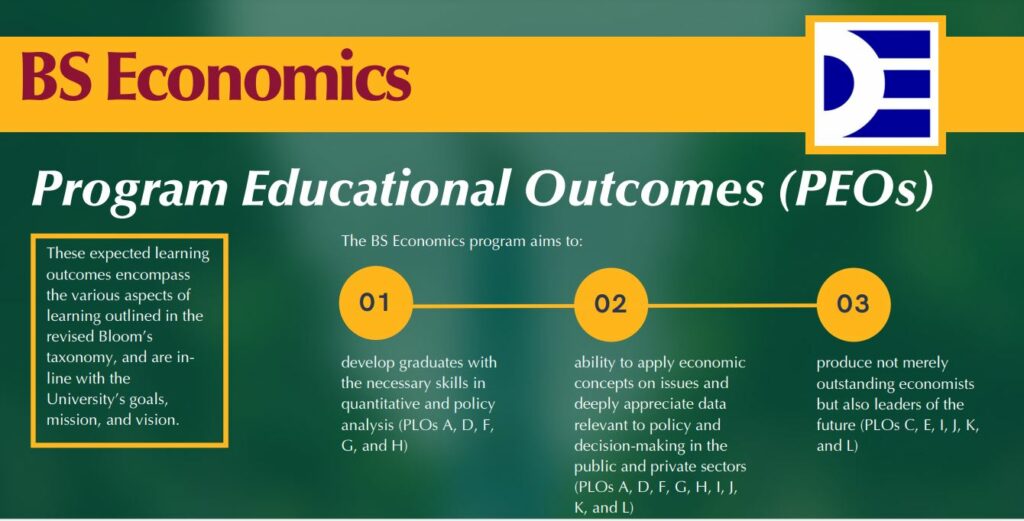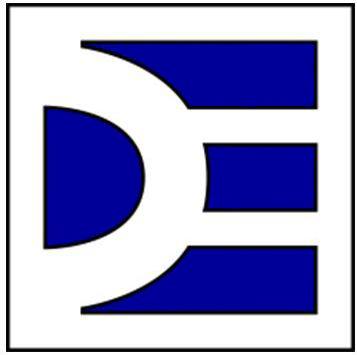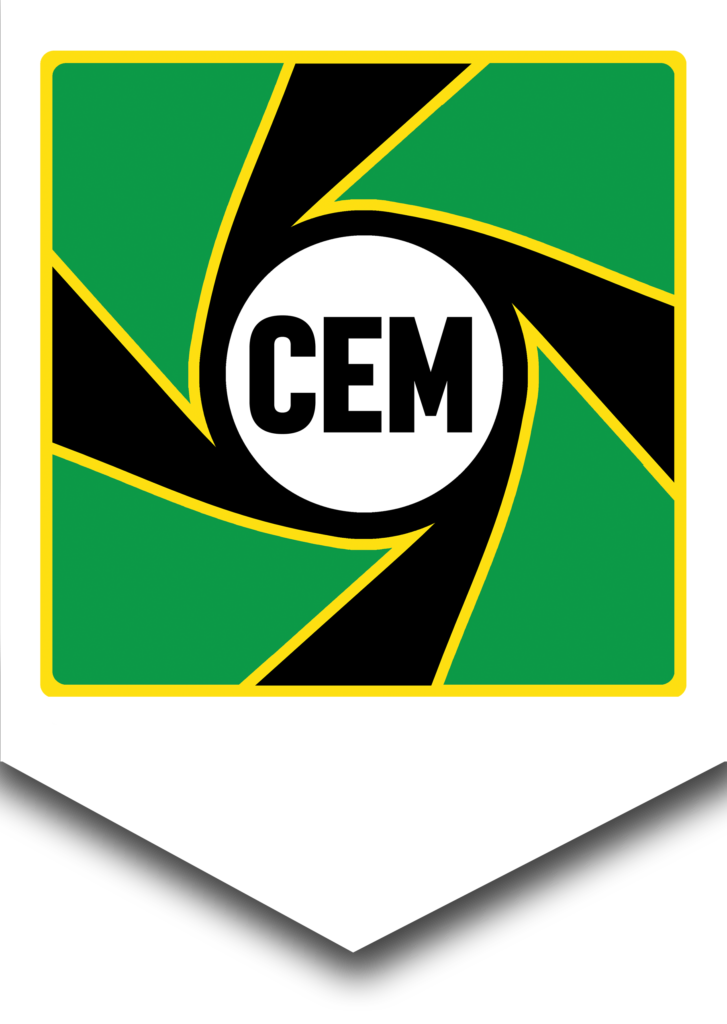Academic Programs
The Program
The Bachelor of Science in Economics Program was instituted in 1986. The program was born out of the necessity of constructing alternative development strategies for overcoming the economic crisis which beset the country during the period. These strategies required the consideration of prevailing economic concerns which included, among others, the heavy debt burden, poverty, unemployment, unproductive and inefficient industries, as well as malnutrition. Furthermore, there was a need to better
understand the impacts of natural resource exploitation and environmental degradation on the country’s development path.
The BS Economics program aims to produce graduates who possess:
- the necessary skills in quantitative and policy analyses for teaching and research in economics;
- the ability to analyze, synthesize, and evaluate economic concepts, issues, and data relevant to policy decision- making in the public or private sector; and
- a deep appreciation of the economic issues and problems besetting the country, as well as an objective and critical attitude towards the arguments and policies meant to address them.
Specialization
- Development Economics—focuses on theories and problems of growth; developmental survey of experiences in low- income and high income countries.
- Environmental Economics—centers on the economic role of environment in growth and development.
Requirements
Students in the Program are required to complete 135 academic units, usually in about four years. The Curriculum is divided into three components:
- (a) The general education courses aim to develop well-rounded students and give exposure to the non-economic aspects of society.
- (b) Core courses provide rigorous training in economic theory and analytical tools.
- (c) Students can choose between development economics and environ-mental economics as an area of specialization.
New Freshmen are admitted directly to the program through the UP College Admission Test (UPCAT).
Career Prospects
Courses Offered
| Course Code | Description |
|---|---|
| ECON 11 | General Economics |
| ECON 101 | Intermediate Macroeconomic Theory |
| ECON 102 | Intermediate Microeconomic Theory |
| ECON 103 | Introduction to Growth Theory and Open Economy Macroeconomics |
| ECON 104 | Introduction to Factor Market Analysis, General Equilibrium and Welfare Economics |
| ECON 110 | History of Economic Doctrines |
| ECON 115 | Philippine Economic History |
| ECON 121 | Money and Banking |
| ECON 130 | Elements of Mathematical Economics |
| ECON 137 | Introduction to Econometrics |
| ECON 138 | Intermediate Econometrics |
| ECON 141 | International Economics |
| ECON 151 | Public Economics |
| ECON 170 | Environmental Economics |
| ECON 175 | Benefit Cost Analysis |
| ECON 185 | Development Economics |
| ECON 199 | Undergraduate Seminar |
| ECON 200 | Undergraduate Thesis |
| Course Code | Description |
|---|---|
| ECON 106 | Consumption Economics |
| ECON 134 | Experimental Economics |
| ECON 155 | Economics of Regulation |
| ECON 166 | Fundamentals of Energy Economics |
| ECON 172 | Economic Analysis of Pollution Control Policies |
| ECON 176 | Economics of Climate Change and Adaptation |
| ECON 181 | Human Resource Economics |
| ECON 191 | Special Topics in Financial Economics: Fundamental, Technical and Behavioral Analysis of Financial Markets (2SAY2223) |
Downloadables
- UPLB OCS Form No.105 Application for Revision in the Approved Plan of Course Work
- UPLB OCS Form No.106 Application for Substitution of Courses
- Academic Advisers as of 2nd Semester AY2022–2023
- BSECON Curriculum
- BS ECON GE Program Plan of Study (DE FORM 101)
- BS ECON Plan of Study (DE FORM 102)
- Student Form for Raising Clarifications on Class Requirement Scores and Rechecking
- List of Specialization Courses and Corresponding Prerequisite
- Program Educational Outcomes and Program Learning Outcomes of the BS Economics Program


Brief description of the major field
The Master of Science in Economics Program aims to develop graduates with soled foundations in Economic theory, and who are strongly equipped with quantitative methods; and produce graduates who have the unique characteristics of being able to carry out scientific investigation in related disciplines where the University of the Philippines Los Baños is strong, where the crucial problem of current and intertemporal scarcity of resources has be to be and squarely confronted.
Prospective Students
BA/BS degree holders with sufficient background in Economics
Selling Points and Opportunities
MS ECON graduates can join the academe to teach or do research in the public and private sectors .
Requirements and mechanics to graduate
The MS ECON program requires students to earn at least 32 units of graduate work. This consists of 15 units of core courses (ECON 201, ECON 202, ECON 230, ECON 237, ECON 203 or ECON 204); 9 units of specialization courses; 2 units of seminar (ECON 299) 6 units of master’s thesis (ECON 300).
All applicants will be given validation examination in undergraduate level macroeconomic theory, microeconomic theory, mathematical economics, and econometrics. Applicants who pass this examinations will not be required to undergo the Summer Program in Economics.
The Summer Program in Economics (SPE) is a two month program offered regularly from June to July of each year. For the prospective applicant to proceed to the regular graduate program, he/she must obtain a weighted average grade of 2.00 or better in four modules in the SPE.
Graduate Course
ECON 201. Macroeconomic Theory I (3). Theories of income and employment determination and the business cycle; theories of inflation and unemployment; the macroeconomy and the fiscal, monetary, and external sectors; open economy macroeconomics; stabilization policies. 3 hrs (class). PR. ECON 101 or COI. (1)
ECON 202. Microeconomic Theory I (3). Preference and choice; consumer choice and demand; production costs, profits, and supply; competitive markets; market structure; externalities, public goods, and market failure; general equilibrium and welfare. 3 hrs (class). PR. ECON 102 or COI. (1)
ECON 231. Economic Dynamics (3). Dynamic analysis and dynamic optimization with applications in economics. 3 hrs (class).PR. ECON 230. (2)
ECON 237. Econometrics (3). Single equation and simultaneous equation problems; techniques of estimation, specification, and identification problems in economic analysis. 3 hrs (class). PR. AECO 103, ECON 137, or COI. (1)
ECON 238. Econometric Time Series Analysis. (3). Theory of difference equations, stationary time-series models, unit root processes, multi-equation time-series models, cointegration and error-correction models. 3 hrs (class). PR. ECON 237. (2)
ECON 239. Economy-Wide Modeling (3). Macro-economic models and applied general equilibrium models. 3 hrs (class). PR. ECON 201, ECON 202, ECON 230 and ECON 237. (2)
ECON 241. International Trade and Commercial Policy (3). Causes of trade and effects on resource allocation, economic growth, and income distribution. Selected issues in international commercial trade policies particularly those relating to agricultural commodity trade. 3 hrs (class). PR. ECON 201 and ECON 202. (2)
ECON 271. Advanced Resource Economics (3). Applications of economic concepts such as social welfare, externalities, social cost and gains to decision-making associated with optimizing use of natural resources. 3 hrs (class). PR. AECO 240 or COI. (2)
ECON 275. Economic Valuation of Environmental and Natural Resource System (3). Approaches and techniques for economic measurements and valuation of natural resources and environmental impacts of development. 3 hrs ( class). PR. COI. (2)
ECON 291. Special Topics (1-3). May be taken twice provided that total number of units to be credited to the student’s program will not exceed 4 units. PR. COI.
ECON 299. Graduate Seminar in Economics (1). PR. COI. (1,2). May be taken twice for a maximum of 2 units.
ECON 300. Master’s Thesis (6). (1,2,S)
Adopted Courses from UP Diliman
ECON 203. Macroeconomic Theory II (3). Theories of consumption, saving and investment; theories of growth, theories of economic development and accumulation. 3 hrs (class). PR. ECON 201. (2)
ECON 204. Microeconomic Theory II (3). Information assymetry; hidden action; equilibrium under uncertainty and over time; social choice; axiomatic bargaining; incentive and mechanism design. 3 hrs (class). PR. ECON 202 or COI. (2)
ECON 230. Mathematical Economics (3). Applications of linear algebra, theory of functions, linear and nonlinear optimization in economic theory. 3 hrs (class). PR. COI. (1)
ECON 251. Public Economics (3). Market failures; theory of public goods; public choice and incentive mechanisms for good allocation; public sector pricing; incentive effects of taxation; optimal taxation and redistribution. 3 hrs (class). PR. ECON 202 or COI. (2)
ECON 285. Development Economics I (3). Theories of economic growth and development; background and comparative analyses of growth in developed and developing countries. 3 hrs (class). PR. ECON 201 or COI. (2)

